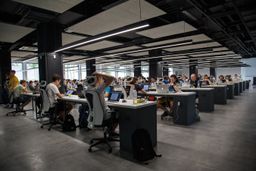In a framework where even one’s own work is weighed, The four-day workday began to become a topic of discussion. Conventions, technology, and society change, and with them, opportunities arise.
A recent study published by Autonomy, collected by Guardianpoints to a revolutionary future: the application of artificial intelligence can open the door to it shorter work week, ensuring equal or greater productivity.
This perspective not only meets the aspirations of many workers, but also raises important questions about work-life balance.
The report explores how the integration of advanced technologies such as GPT-4 is reshaping the employment landscape in the UK. Through careful evaluation, it was revealed that efficient task automation using AI can reduce the required work hours significantly, without reducing productivity.
Imagine, for example, an office environment where AI assistants perform data analysis in minutes, a task that previously took human employees hours. These time savings not only increase efficiency, but also free up workers to focus on more creative, less repetitive tasks.
Furthermore, the Autonomy study highlights how reduction of the working week can have a positive impact on mental health and employee physique. Less stress and more time for personal and family activities are just a few of the potential benefits.
Germany is testing reduced working hours and Microsoft considers AI in the company very profitable
This is similar to what has been under consideration in Germany and other countries, where since this fall they have been experimenting with a four-day workday under a 100-80-100 system (100% of the employee’s salary, with a reduction of 80% on weekdays and achieve 100% performance in terms of productivity).
In this regard, Microsoft’s latest study is even more positive and confirms that the adoption of AI in enterprises is proceeding very quickly and providing three times the benefits in less than a year.
But once again, this new study not only raises exciting possibilities and believes it is possible, but also invites deep reflection on how we, as a society, can take full advantage of the benefits of new technology and live better lives, for all.
Of course, the road to a four-day work week future is not without challenges. Integrating AI into the workplace requires careful planning, investment, and most importantly, an ethical approach that prioritizes human well-being above company profits, or even enhances it by taking care of its employees.

“Internet trailblazer. Troublemaker. Passionate alcohol lover. Beer advocate. Zombie ninja.”








